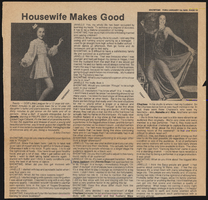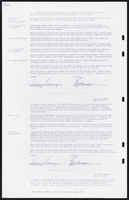Search the Special Collections and Archives Portal
Search Results
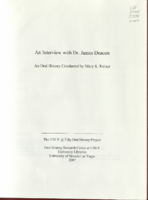
Transcript of interview with Dr. James Deacon by Mary K. Keiser, August 24, 2006
Date
Archival Collection
Description
Text
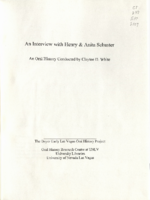
Transcript of interview with Henry and Anita Schuster by Claytee White, March-April 2011
Date
Archival Collection
Description
In this oral history, the long married couple Henry and Anita Schuster recall the history of the 1930s and how they eventually met and created a life together. Their childhoods were distinctively different, but charter a future where they would inevitably meet. Born in Germany in 1926, Henry recalls the dawn of Hitler and the Nazism. His mother would arrange for his evacuation to France, where he would not know her fate or that of his two sisters for a number of years. Along with hundreds of other displaced children, he escaped to America and lived with relatives in Louisiana where he finished his schooling and joined the US Army. Anita on the other hand grew up with her family in New York. They share the story of meeting when she was 16, falling in love and marrying in 1948. They had four children and moved several times before settling in California. They retired to Las Vegas in 1993. Henry's recollections include childhood memories of the Holocaust and its affect on his family, including the loss of his mother and one of his sisters. Finding his surviving sister Bertel (Betty Kale) after the war is a heartwarming tale of survival. The Schusters are part of the approximately 300 members of the Holocaust Survivor Group that has settled in southern Nevada and Henry was President Emeritus of the group. He published his memoir, Abraham's Son-the Making of an American, in 2010.
Text
Audio clip from interview with Judith Steele, November 24, 2014
Date
Archival Collection
Description
In this clip, Judith Steele discusses celebrating the High Holidays and how she influenced Clark County School District to allow Jewish children to observe these days without their absence counting against their attendence record.
Sound
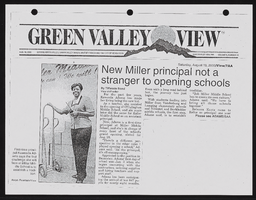
"New Miller principal not a stranger to opening schools": Green Valley View article
Date
Archival Collection
Description
From the Alpha Kappa Alpha Sorority, Incorporated, Theta Theta Omega Chapter Records (MS-01014) -- Chapter records file. Copy of newspaper article regarding Kaweda Adams' (Alpha Kappa Alpha Sorority, Theta Theta Omega Chapter soror) appointment as principal to Miller Middle School
Text

Transcript of interview with Dr. James Frey by Lisa Gioia-Acres, February 14, 2007
Date
Archival Collection
Description
Text

Photograph of C. D. Baker, basketball coach, Las Vegas (Nev.), 1923
Date
Archival Collection
Description
Image
Rosemary Ruymann oral history interview
Identifier
Abstract
Oral history interview with Rosemary Ruymann conducted by Bruce Kraft on February 16, 1977 for the Ralph Roske Oral History Project on Early Las Vegas. In this interview, Ruymann discusses her career as a teacher and life in early Las Vegas, Nevada. Ruymann also describes the excitement surrounding the construction of Hoover (Boulder) Dam and the kinds of people it would attract, such as the president, engineers, and dentists concerned with the amount of fluoride in the proposed area for Lake Mead.
Archival Collection
Hunt, Charles T. "Blackie"
Charles T. "Blackie" Hunt, born in Pottstown, Pennsylvania in 1930, started
accordion lessons at age five. He recounts learning from experienced musicians, then
teaching others at age twelve because his teacher was drafted. He attended West Chester
State Teachers College where, among other accomplishments, he put together a group
with Nick Carlino as tenor sax player.
Person

